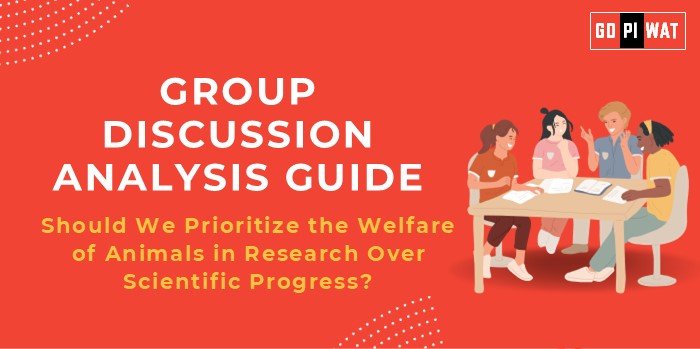📋 Group Discussion (GD) Analysis Guide
🐾 Should We Prioritize the Welfare of Animals in Research Over Scientific Progress?
🌐 Introduction to the Topic
Opening Context: The ethics of animal research has sparked a global debate, balancing advancements in science and the moral imperative to prevent harm to animals. It is a key issue in fields like medicine, biotechnology, and cosmetics.
Topic Background: Historically, animal testing has been central to scientific breakthroughs, such as the development of vaccines and treatments for life-threatening diseases. However, growing awareness of animal welfare and the emergence of alternative testing methods have intensified calls for ethical reform. Recent global movements advocating for cruelty-free products have further highlighted the issue.
📊 Quick Facts and Key Statistics
- 🐾 Number of Animals Used in Research: Over 100 million annually worldwide (Source: Humane Society International).
- 🌍 Regulatory Changes: EU banned animal testing for cosmetics in 2013; India followed suit in 2014.
- ❓ Alternatives Available: Over 95% of drug trials fail even after animal testing, questioning its predictive reliability.
- 🗣️ Public Sentiment: 62% of people globally favor banning animal testing where alternatives exist (Source: PETA).
👥 Stakeholders and Their Roles
- Scientific Community: Advocates for animal research as essential for breakthroughs while exploring alternatives.
- Government Regulators: Balance ethical considerations with scientific progress by setting policies.
- Animal Welfare Organizations: Push for cruelty-free research and highlight ethical concerns.
- Consumers and Activists: Demand cruelty-free products, influencing industry practices.
- Private Sector: Invest in research methods that reduce or replace animal testing, driven by ethical concerns and market demand.
🏆 Achievements and Challenges
✨ Achievements
- Life-Saving Medical Breakthroughs: Vaccines for diseases like polio and COVID-19.
- Development of Alternatives: Technologies like organ-on-a-chip and AI simulations.
- Policy Advancements: Bans on animal testing in cosmetics in over 40 countries.
⚠️ Challenges
- Ethical Dilemma: Balancing animal welfare with potential human benefits.
- Lack of Viable Alternatives: For complex biological systems, substitutes remain limited.
- Global Inconsistency: Developing nations often lack strong regulations, leading to unethical practices.
Global Comparisons: EU pioneers in banning non-essential animal testing, while China recently eased mandatory animal testing for cosmetics.
Case Study: India’s Ban on Cosmetic Animal Testing: An example of aligning policy with ethical values without stifling industry growth.
📚 Structured Arguments for Discussion
- Supporting Stance: “Prioritizing animal welfare reflects a society’s ethical progress and encourages innovative alternatives that can outperform traditional methods.”
- Opposing Stance: “Scientific progress, particularly in medicine, often necessitates animal testing as alternatives are still not fully reliable.”
- Balanced Perspective: “While animal testing remains crucial for now, prioritizing research into alternatives can bridge the gap between ethics and progress.”
💡 Effective Discussion Approaches
- Opening Approaches:
- 🐾 Ethical Perspective: “Is it morally justifiable to cause harm to animals when alternatives could achieve similar results?”
- 📊 Data-Driven Start: “Over 95% of drug trials fail post-animal testing, questioning the practice’s effectiveness.”
- 📜 Historical Lens: “Vaccines like polio and COVID-19, which saved millions, relied on animal testing.”
- Counter-Argument Handling:
- Highlight technological progress in alternatives (e.g., AI-driven models).
- Emphasize incremental policy changes rather than abrupt bans.
📈 Strategic Analysis of Strengths and Weaknesses
- Strengths: Encourages ethical innovation; aligns with public sentiment; enhances brand image for companies.
- Weaknesses: Slows progress in areas like vaccine development; limited alternatives for complex testing.
- Opportunities: Growth of cruelty-free markets; global leadership in ethical science.
- Threats: Research outsourcing to less-regulated regions; resistance from traditional scientific communities.
🌍 Connecting with B-School Applications
- Real-World Applications: Case studies on ethical decision-making; innovative product development strategies.
- Sample Interview Questions:
- “How should governments regulate animal testing in developing nations?”
- “Can scientific innovation thrive without ethical compromises?”
- Insights for B-School Students: Highlight ethical considerations in leadership; explore sustainability-focused strategies.


